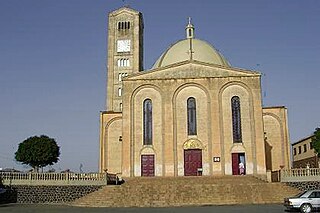Related Research Articles

Eritrea is an ancient name,associated in the past with its Greek form Erythraia,Ἐρυθραία,and its derived Latin form Erythræa. This name relates to that of the Red Sea,then called the Erythræan Sea,from the Greek for "red",ἐρυθρός,erythros. The Italians created the colony of Eritrea in the 19th century around Asmara,and named it with its current name. After World War II,Eritrea was annexed to Ethiopia. In 1991,the communist Ethiopian government was toppled by Eritrean people liberation front (EPLF) which earned their independence. Eritrea officially celebrated its 1st anniversary of independence on May 24,1991

The Politics of Eritrea and the Government of Eritrea takes place in a framework of a single-party presidential republican totalitarian dictatorship. The President officially serves as both head of state and head of government. The People's Front for Democracy and Justice is the only political party legally permitted to exist in Eritrea. The popularly elected National Assembly of 150 seats,formed in 1993 shortly after independence from Ethiopia,elected the current president,Isaias Afwerki. There have been no general elections since its official independence in 1993. A new constitution was drafted in 1993 and ratified in 1997,but has not been implemented. Since the National Assembly last met in January 2002,President Isaias Afwerki has exercised the powers of both the executive and legislative branches of government.

Asmara,or Asmera,is the capital and most populous city of Eritrea,in the country's Central Region. It sits at an elevation of 2,325 metres (7,628 ft),making it the sixth highest capital in the world by altitude and the second highest capital in Africa. The city is located at the tip of an escarpment that is both the northwestern edge of the Eritrean Highlands and the Great Rift Valley in neighbouring Ethiopia. In 2017,the city was declared as a UNESCO World Heritage Site for its well-preserved modernist architecture. The site of Asmera was first settled in 800 BC with a population ranging from 100 to 1,000. The city was then founded in the 12th century AD after four separate villages unified to live together peacefully after long periods of conflict. Under Italian rule the city of Asmara was made capital of Eritrea in the last years of the 19th century.
Lorenzo Taezaz was an important diplomatic official for Ethiopia. He served as Emperor Haile Selassie's diplomatic representative during the Emperor's exile in Britain following the Second Italo-Ethiopian War,being the permanent delegate from Ethiopia to the League of Nations. After the restoration of the Ethiopian government,Lorenzo was Minister of Foreign Affairs,Minister of Posts and Telegraph,and served in the Ethiopian Senate.
Seyoum Mesfin Gebredingel was an Ethiopian politician and diplomat. He was Ethiopia's Minister of Foreign Affairs from 1991 to 2010 and served as Ethiopia's Ambassador to China from 2011 to 2017.

The Eritrean–Ethiopian War,also known as the Badme War,was a major armed conflict between Ethiopia and Eritrea that took place from May 1998 to June 2000. The war has its origins in a territorial dispute between the two states. After Eritrea gained independence from Ethiopia,relations were initially friendly. However,disagreements about where the newly created international border should be caused relations to deteriorate significantly,eventually leading to full scale war. According to a 2005 ruling by an international commission,Eritrea broke international law and triggered the war by invading Ethiopia. By 2000,Ethiopia held all of the disputed territory and had advanced into Eritrea. The war officially came to an end with the signing of the Algiers Agreement in 12 December 2000;however,the ensuing border conflict would continue on for nearly two decades.

The Eritrean Catholic Church is a metropolitan sui iuris Eastern particular church headquartered in Asmara,Eritrea. It was established in 2015 by separation of its territory from that of the Ethiopian Catholic Church and the setting up in that territory of a new sui iuris metropolitan Eastern Catholic Church. It follows the Ge'ez form of the Alexandrian liturgical rite. Its strictly-speaking official name is "The Asmara metropolitan sui iuris Church".

The Regional Administrators of Eritrea are appointed centrally by the President of Eritrea. The Regional Administrators supervise and work in collaboration with their elected Regional Assemblies.

This article,dealing with the Coptic Orthodox Church in Africa,is about the Coptic Orthodox Church of Alexandria in African countries other than Egypt.

Eritrea–United States relations are bilateral relations between Eritrea and the United States.

Religion in Eritrea consists of a number of faiths. The two major religions in Eritrea are Christianity and Islam. However,the number of adherents of each faith is subject to debate. Estimates of the Christian share of the population range from 47% and 63%,while estimates of the Muslim share of the population range from 37% to 52%.

Eritrea,officially the State of Eritrea,is a country in the Horn of Africa region of Eastern Africa,with its capital and largest city at Asmara. It is bordered by Ethiopia in the south,Sudan in the west,and Djibouti in the southeast. The northeastern and eastern parts of Eritrea have an extensive coastline along the Red Sea. The nation has a total area of approximately 117,600 km2 (45,406 sq mi),and includes the Dahlak Archipelago and several of the Hanish Islands.

Italian Eritrea was a colony of the Kingdom of Italy in the territory of present-day Eritrea. The first Italian establishment in the area was the purchase of Assab by the Rubattino Shipping Company in 1869,which came under government control in 1882. Occupation of Massawa in 1885 and the subsequent expansion of territory would gradually engulf the region and in 1889 borders with the Ethiopian Empire were defined in the Treaty of Wuchale. In 1890 the Colony of Eritrea was officially founded.

Denmark–Eritrea relations refers to the current and historical relations between Denmark and Eritrea. Denmark is represented in Eritrea through its embassy in Nairobi,Kenya,and Eritrea is represented in Denmark through its embassy in Stockholm,Sweden.
African-Americans in foreign policy in the United States catalogs distinguished African Americans who have and continue to contribute to international development,diplomacy,and defense through their work with the U.S. Department of State,the U.S. Agency for International Development,the U.S. Information Agency,and the U.S. Congress,and other notable agencies and non-governmental organizations. The creators acknowledge the presence of the interagency contributions to the foreign affairs realm,and welcome additional content to showcase the achievements of African-Americans in other relevant USG agencies.

Eritrea–India relations refers to the international relations that exist between Eritrea and India. Eritrea maintains an embassy in New Delhi. India maintains an embassy in Asmara since 2021. Erstwhile,India was represented to Eritrea through its High Commission in Khartoum,Sudan.
The following is a timeline of the history of the city of Asmara,Eritrea. Asmara was under Italian colonial rule from 1889 until 1941.
The 2018 Eritrea–Ethiopia summit was a bilateral summit that took place on 8–9 July 2018 in Asmara,Eritrea,between Eritrean President Isaias Afwerki and Ethiopian Prime Minister Abiy Ahmed and officials from the two countries.

Eritrea–Italy relations are the bilateral relations between Italy and Eritrea. Both nations are members of the United Nations.
References
- ↑ "Semere Hadera" (PDF). Archived from the original (PDF) on 2007-09-28. Retrieved 2007-01-12.
- ↑ Last, Alex (2001-10-02). "Eritrea plays down diplomatic row". BBC. Retrieved 2007-01-12.
- ↑ "Eritrea appoints new foreign affairs minister" . Retrieved 2007-04-18.
- ↑ Aregay, Daniel. "Eritrea appoints first ambassador to Ethiopia in 20 years". www.aljazeera.com. Retrieved 2018-07-21.